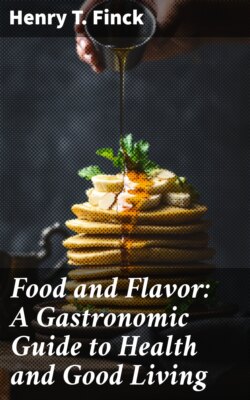Читать книгу Food and Flavor: A Gastronomic Guide to Health and Good Living - Henry T. Finck - Страница 25
На сайте Литреса книга снята с продажи.
A NEW PSYCHOLOGY OF EATING.
ОглавлениеTable of Contents
The French physiologist Longet and the German anatomist Henle were, so far as I could find, the only experts who had an inkling of the gastronomic importance of the sense of smell; but they did not go so far as to formulate the theory I have just expressed in italics. My experiments showed me that not only is it impossible, with the nose clasped (or closed by a cold), to tell the difference between various kinds of meats, or cheeses, or cakes, or vegetables, but also—which no one had ever pointed out—that even in the case of sweet and sour substances which do gratify the palate, the sense of smell is much more important than the sense of taste.
Vinegar, for example, is absolutely uninteresting unless it has a "bouquet"—the aroma of the cider, wine, or malt of which it is made. And why is it that we are willing to pay from five to twenty times as much for candy as for plain sugar? Because the sugar appeals only to the taste, whereas the candy is usually perfumed with the aroma of sarsparilla, wintergreen, vanilla, chocolate, and a hundred other flavoring ingredients the fragrance of which we enjoy by exhaling through the nose while eating it.
The emphasis lies on the word exhaling. It is considered a breach of etiquette to smell of things at the table in the ordinary way, because it implies a doubt as to the freshness of the food. But there is a second way of smelling of which most persons are unconscious, although they practise it daily. Anatomy shows that only a small portion of the mucous membrane which lines the nostrils is the seat of the endings of the nerves of smell. In ordinary expiration the air does not touch this olfactory region. But when we eat in the right way we unconsciously guide the air impregnated with the Flavors of the food we are munching, into that region, and that is the way we enjoy our food. We do this unconsciously, I say; but now try and do it consciously, guiding the expired air very slowly through the nose, and your enjoyment of a meal will be quintupled.
Obviously Kant made the mistake of his life when he said the sense of smell was not worth cultivating. It not only provides us with additional table pleasures, the hygienic and tonic value of which has been sufficiently dwelt upon, but it is a fact of unspeakable importance that the more we educate the nose, the more discriminating we make it, and the more stubbornly therefore we insist on having wholesome food only.
This new psychology of eating I set forth for the first time in the "Contemporary Review" (London, November, 1888), under the title of "The Gastronomic Value of Odors." It was commented on as a psychological curiosity, but otherwise attracted little attention. At that time there was not the same general interest that there is now in the food question. Even Gladstone's directions regarding eating were more frequently smiled at than followed.
Since his day many things have happened to give the food question an aspect of superlative importance, particularly the wholesale adulterations described in the preceding pages. That among those who have helped to awaken the public to a realizing sense of the importance of this subject no one deserves more credit than Mr. Fletcher—who has been immortalized in the dictionaries by the inclusion of the verb "to Fletcherize"—has been stated before. So beneficent, on the whole, has been his influence that I hesitate to point out any of his mistakes; but as some of them obscure the truth, I will do so.
He first made public his views, in a crude form, eleven years after the appearance of my article on the gastronomic value of odors. That article anticipates some important details of his doctrines, but he evidently never saw it, because in his books he makes only one brief reference to the sense of smell and perpetuates all the old errors regarding that insolent pretender, the sense of taste. This is to be regretted, for it left his followers groping in the dark as to the best way of getting the most pleasure and benefit out of their food, at home and at their "munching parties."
There is one detail of Fletcherism which every epicure will fight with his last drop of ink. If we all followed his example, living on griddle cakes, butter, and syrup (at a cost of eleven cents a day), or some other equally simple menu, as he advises, what would become of that delectable variety which is the spice of gastronomy, and what of the farmers, and the hundreds of industries which supply this variety?
True gastronomic progress, I maintain, lies in the direction of multiplying the pleasures of the table—an important phase of our subject which will be discussed in a later chapter.
We must now turn the limelight once more on Ungastronomic America.
